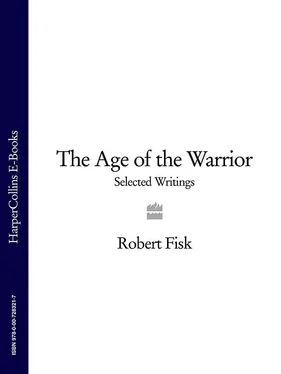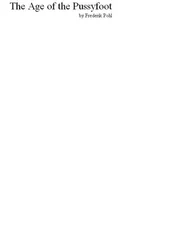The plots in which bin Laden is now supposed to have been involved, according to the Americans, are now taking on Gone with the Wind proportions. Bin Laden, we are told, was behind not only the US embassy bombings, but also the earlier bombing of US troops in Dhahran, anti-government violence in Egypt, the 1993 New York bombing of the World Trade Center, and now – wait for it – an attempt to kill the Pope. Is this really conceivable? The fact that all this was taken at face value by so many reporters probably says as much about the state of journalism as it does about American paranoia.
The use of the word ‘terrorist’ – Arabs who murder the innocent are always ‘terrorists’ but Israeli killers who slaughter twenty-nine Palestinians in a Hebron mosque or assassinate their prime minister, Yitzhak Rabin, are called ‘extremists’ – is only part of the problem. ‘Terrorist’ is a word that avoids all meaning. The who and the how are of essential importance. But the ‘why’ is something the West usually prefers to avoid. Not once yesterday – not in a single press statement, press conference or interview – did a US leader or diplomat explain why the enemies of America hate America. Why is bin Laden so angry with the United States? Why – not just who and how – but why did anyone commit the terrible atrocities in Africa?
Clearly, someone blew up the US embassies in Nairobi and Dar es-Salaam. They may have been suicide bombers, but they must have known that they were slaughtering the innocent. Their deeds were wicked. But they were not, as one US diplomat called them, mindless. Whether or not bin Laden was involved, there was a reason for these dreadful deeds. And the reason almost certainly lies with US policy – or lack of policy – towards the Middle East. ‘How can America protect its embassies?’ a US radio station asked me last week. When I suggested it could adopt fairer policies in the region, I was admonished for not answering a question about ‘terrorism’.
For what really lies at the root of Arab reaction to the US attacks on Sudan and Afghanistan is that they come when America’s word has never been so low; when the Arab sense of betrayal has never been greater. America’s continued military presence in Saudi Arabia, its refusal to bring Israel to heel as it continues to build Jewish settlements on Arab land in violation of the Oslo agreement, its almost lip-smacking agreement to continue sanctions which are clearly culling the civilian population of Iraq; Arab fury at this catastrophe is one reason why a normally compassionate people responded with so little sympathy to the bombing of the US embassies. After all this, being lectured by Mr Clinton and then bombed by him was like getting a kick in the teeth from a man who has already stabbed you in the back.
Bin Laden or not, it is a fair and fearful bet that the embassy bombings were organised by – or at the least involved – Arabs. And the culprits should be found and brought to justice. But Cruise missiles do not represent due process, as Mr Clinton knows all too well. Talk of a massive ‘international terrorist conspiracy’ is as exotic as the perennial Arab belief in the ‘international Zionist conspiracy’. Bin Laden is protected in Afghanistan by the Taliban. But the Taliban are paid, armed and inspired by Saudi Arabia. And Saudi Arabia is supposed to be America’s best friend in the Gulf, so close an ally that US troops are still stationed there (which is, of course, bin Laden’s grouse). Could it be that powerful people in Saudi Arabia, a fundamentalist and undemocratic state if ever there was one, support bin Laden and share his desire for a ‘jihad’ against America? This is one question the Americans should be asking.
Bin Laden himself was obsessed for many months with the massacre of Lebanese civilians by the Israelis at the UN base at Qana in southern Lebanon in April 1996. Why had Clinton not condemned this ‘terrorist act’, he asked. (In fact, Bill Clinton called it a ‘tragedy’, as if it was some form of natural disaster – the Israelis said it was a ‘mistake’ but the UN concluded it wasn’t). Why had the perpetrators not been brought to justice, bin Laden wanted to know? It is odd now to compare bin Laden’s words with those of Bill Clinton just forty-eight hours ago. They talked much the same language. And now their language has grown far more ferocious. ‘The United States wants peace, not conflict,’ Clinton said. He is likely to find little peace in theMiddle East for the rest of his presidency.
The Independent , 22 August 1998
Brace yourself for Part Two of the War for Civilisation
It needed my old Irish journalist colleague Vincent Browne to point out the obvious to me. With a headache as big as Afghanistan, reading through a thousand newspaper reports on the supposed ‘aftermath’ of the Afghan war, I’d become drugged by the lies. Afghan women were free at last, ‘our’ peacekeeping force was on its way, the Taliban were crushed. Anti-American demonstrations in Pakistan had collapsed – we’ll forget my little brush with some real Afghans there a couple of weeks ago. Al-Qaeda was being ‘smoked out’ of its cave. Osama bin Laden was – well, not captured or even dead; but – well, the Americans had a videotape, incomprehensible to every Arab I’ve met, which ‘proves’ that our latest monster planned the crimes against humanity in New York and Washington.
So it needed Vincent, breathing like a steam engine as he always does when he’s angry, to point to the papers in Gemma’s, my favourite Dublin newsagents. ‘What in Christ’s sake is going on, Bob?’ he asked. ‘Have you seen the headlines of all this shite?’ and he pulled Newsweek from the shelf. The headline: ‘After The Evil’. ‘What is this biblical bollocks?’ Vincent asked me. Osama bin Laden’s overgrained, videotaped face stared from the cover of the magazine, a dark, devilish image from Dante’s circles of hell. When he captured Berlin, Stalin announced that his troops had entered ‘the lair of the fascist beast’. But the Second World War has nothing on this.
So let’s do a ‘story-sofar’. After Arab mass-murderers crashed four hijacked aircraft into the World Trade Center, the Pentagon and Pennsylvania, a crime against humanity which cost more than 4,000 innocent lives, President Bush announced a crusade for infinite ‘justice’ – later downgraded to infinite freedom – and bombed Afghanistan. Using the gunmen and murderers of the discredited Northern Alliance to destroy the gunmen and murderers of the discredited Taliban, the Americans bombed bin Laden’s cave fortresses and killed hundreds of Afghan and Arab fighters, not including the prisoners executed after the Anglo–US–Northern Alliance suppression of the Mazar prison revolt.
The production of the bin Laden videotape – utterly convincing evidence of his guilt to the international press, largely, if wilfully, ignored by the Muslim world – helped to obscure the fact that Mr Evil seemed to have disappeared. It also helped to airbrush a few other facts away. We could forget that US air strikes, according to statistics compiled by a New Hampshire university professor, have now killed more innocent Afghans than the hijackers killed Westerners and others in the World Trade Center. *We could forget that Mullah Omar, the mysterious leader of the Taliban, has also got away. We could ignore the fact that, save for a few brave female souls, almost all Afghan women continued to wear the burqa. We could certainly close our eyes to the massive preponderance of Northern Alliance killers represented in the new UN-supported, pro- Western government in Kabul. We could clap our hands when a mere fifty Royal Marines arrived in Afghanistan this weekend to support a UN-mandated British-led ‘peace’ force of only a few thousand men who will need the Kabul government’s permission to operate in the city and which, in numbers, will come to about one-third of the complement of the British army destroyed in the Kabul Gorge in 1842. The ‘peace’ force thinks it will have to defend humanitarian aid convoys from robbers and dissident Taliban. In fact, it will have to fight off the Northern Alliance mafia and drug-growers and warlords, as well as the vicious guerrillas sent out to strike them by bin Laden’s survivors. If nothing else, the Taliban made the roads and villages of Afghanistan safe for Afghans and foreigners alike. Now, you can scarcely drive from Kabul to Jalalabad.
Читать дальше












